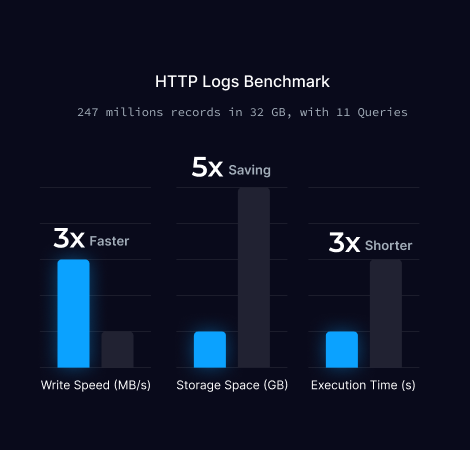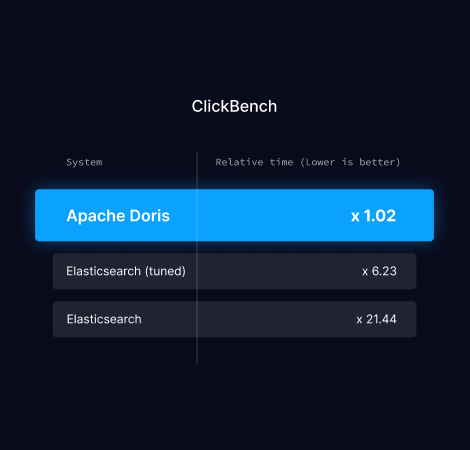Alternative to Elasticsearch
Elasticsearch and Apache Doris are both popular in observability, cybersecurity, and real-time analytics. However, Elasticsearch can be costly in terms of storage and write resources. Apache Doris reduces these costs through efficient storage and high compression, and offers comprehensive analytical capabilities, such as JOIN and superior query performance.
Featured Migration Cases
“By replacing Elasticsearch with VeloDB(Powered by Apache Doris), GuanceDB showcases a big stride in improving data processing speed and reducing costs.”
Highlight:
- 70% Cost Reduction
- 2-3x Faster full-text search performance
- Variant Data type is flexible to handle semi-structured data in log tracing
“Previously, we used multiple components for complex security analysis... Adopting Doris as a unified solution has significantly improved data writes, query performance and storage efficiency.”
Highlight:
- 4x Faster write speeds
- 3x Better query performance
- 50% Storage space savings
“Compared to the original OLAP database, query performance has improved 5-10 times, concurrency has doubled, and analysis time has dropped from 10 minutes to under 1 minute for 90% of cases, all while using just one-third of the original resources.”
Highlight:
- 2x Increasing report analysis concurrency
- 65% Storage space reduction
- Simplified query with standard SQL
Apache Doris vs. Elasticsearch
| Apache Doris | Elasticsearch | |
|---|---|---|
| Open Source License |
|
|
| Architecture |
Higher flexibility and elasticity: |
Traditional deployment with limited elasticity: |
| Real-Time Data Writes |
|
|
| Real-Time Data Storage |
|
|
| Real-Time Data Queries |
|
|
Performance Comparison
Observability & Cyber Security
The HTTP Logs benchmark is an official Elasticsearch performance test designed for log storage and analysis. It uses a real-world HTTP log dataset to evaluate indexing performance, storage efficiency, and query performance.
This benchmark comprises 11 queries commonly used in log analysis scenarios, including keyword search, time range queries, aggregations, and sorting. As a result, it is highly suitable for assessing performance in observability and network security analysis contexts.

Real-Time Analytics
ClickBench is a benchmarking tool to evaluate the performance of analytical databases. It focuses on testing the performance of large, flat tables rather than complex multi-table joins. It uses real-world data from a major web analytics platform, covering typical scenarios such as clickstream analysis and structured logs.
The benchmark consists of a set of queries that test aggregation operations and single-table performance, without involving complex joins. This makes it especially useful for evaluating databases optimized for real-time analytics and large-scale data processing.
Note: These test results are archived benchmarks captured in December 2024. Current real-time comparisons are maintained at ClickBench.

More Migration Stories
-
Why Apache Doris is a Better Alternative to Elasticsearch for Real-Time Analytics
-
Creator of Talkie migrated from Loki and built a PB-scale logging system with Apache Doris
-
How Tencent Music saved 80% in costs by migrating from Elasticsearch to Apache Doris
-
Apache Doris for log and time series data analysis in NetEase, why not Elasticsearch and InfluxDB?
